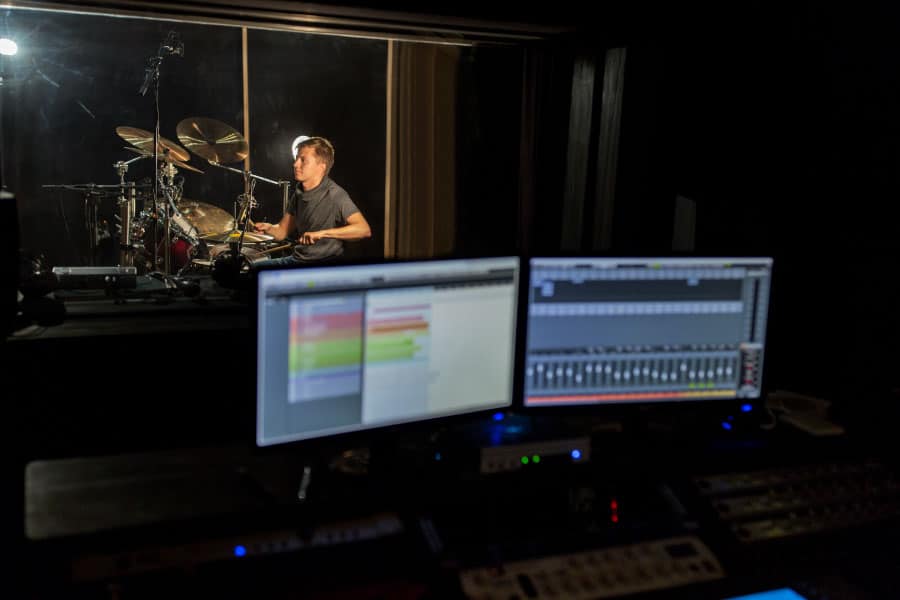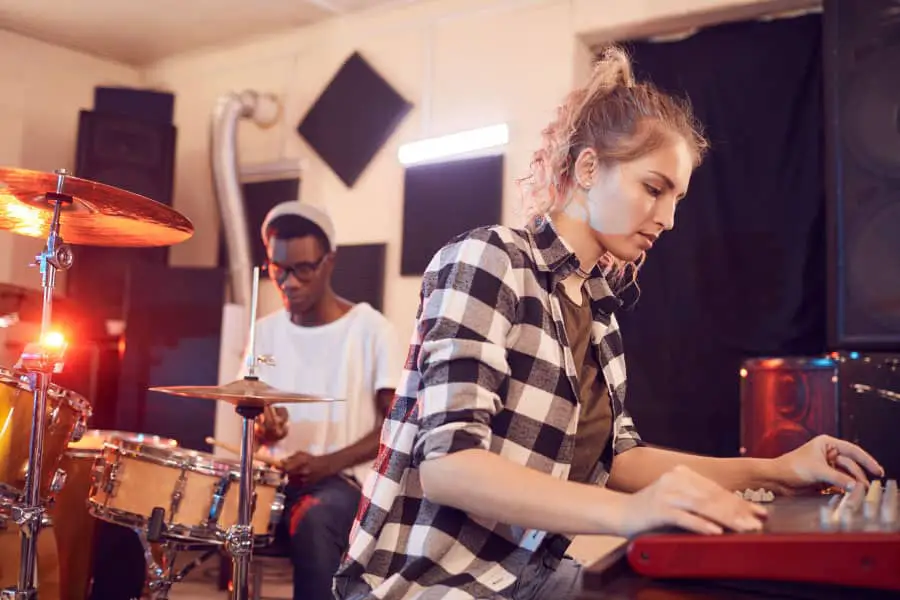
I have always routed my drum kit through a mixer when recording, even when I use my electronic kit and route it straight into my DAW. I will set up separate tracks (channels) for each individual part of the drum kit. If you are new to home studio recording, and especially if you are new to recording drums, you may not know that you should definitely always use a mixer to record drums. Here is why.
A mixer is an invaluable tool that can help you create separation in your drum mix by letting you assign a channel to each individual part of the drum kit. This allows you to affect each audio signal directly and manipulate it in terms of clarity, power, separation, volume, and effects. These attributes directly affect the overall drum sound, which you need to be able to do.
This article will cover what a mixer is and how it works. Then you will understand why it could positively impact our drum recording. Then we will take a look at how many channels a mixer can have and how many your need for drum recordings.
Furthermore, we will look at what factors play a role in us wanting a mixer for recording drums. If you are in the mood to purchase a mixer, I give you a list of the best ones I have had the opportunity to use. Lastly, we will look at how many mics you need to record a drum kit.
What is a mixer and how does it work?
In audio recording and reproduction, a mixer (mixing console) is a device that is used for combining audio signals through individual channels (you can think of them as pathways). Depending on the type of mixer, some may be able to process digital or analog audio signals, and some may be able to do both.
Furthermore, the mixer’s inputs will range by having different connections that can utilize different types of signal inputs, such as XLR balanced inputs and 1/4 inch jack inputs. The sum of each channel combines to produce the output signal that can be sent out the mixer into another device (PA system or audio interface).
How many channels can a mixer have?
Depending on the model, brand, and price, a mixer can have as little as one channel (used for podcasts and such) or as many as 128 channels (used for massive stage productions of any kind).
When looking at purchasing a mixer for the drum kit, you will be recording and trying to figure out how many channels on the mixer you need. You will have to know the size of the kit and the parts that make it up. You need to know what parts you would like to mic up and record, including how many other additional mics you would want (ambient and overhead mics). Then lastly, you need to know how many mics you have and if you can afford more in addition to purchasing a mixer with said number of channels.
Do I need a mixer to record drums?
This is an open-ended question, and we need to look at what type of sound you are trying to accomplish when recording drums. Moreover, we need to look at different aspects of drum recording such as your kit’s size, what your kit contains, how many microphones you have, the size and acoustics of your room, and a few more.
All these factors will play a role in deducing whether you need a mixer or not. However, the bottom line that I stand by and any sound engineer and producer worth their salt will tell you that you need a mixer to record drums. Let’s consider a few of these factors, shall we?
The size of your kit
No matter what instrument you play, you know that a drum kit can range in size from a beginner 5 piece kit to a kit that is so large and has so many added on toms, cymbals, and other pieces of percussion, you may not even be able to see the drummer. Now consider this.
When you record a singer or guitar player, you have one channel dedicated to each of those instruments (yes, your voice is considered an instrument). No matter how many singers or guitar players you record, they will each have their own dedicated channel.
We can say that each part of the drum kit is like a separate singer or guitar player, and in turn, each part of the drum kit needs its own channel.
Why cant I just record a drum kit with 1 channel
You will have separate channels for each part of the kit (or as many channels as you can have depending on your setup) to add your mix’s separation and clarity. When each part of the drum kit is miced up separately, you can adjust and manipulate each channel as if they were their own individual instrument.
When each part or section of the kit is on there own channel, you have to opportunity to EQ, increase volume, add effects, and more to each one of those channels
If you had one or two mics recording the entire kit, the clarity, power, separation, brightness, and oomph would be lost. This is because recording over one or two microphones, you would try to capture the depth of the bass drum, the crisp highs of the cymbals, the snap of the snare, and the full width of the toms, but having one or two microphones just won’t capture all of this sound. Hence it would help if you had a mixer with multiple channels and multiple microphones.
Room acoustics
Depending on what room you are using to record your drums, you would definitely need a mixer with more channels. Besides micing up each individual part of the kit, you would preferably need to record the room’s ambiance.
Remember, when you are listening to a kit, you hear it pass through a room; you are not right in front of it. Setting up the ambient room and overhead mics will give your drum recordings the subtle soft nuances that you need in order for them to sound better.

how many channels do I need to record drums?
The number of channels would be determined by the number of microphones you have. If you only have one microphone, then you can only use one channel. Nevertheless, I would say that the minimum number of channels you need to achieve a clear and relatively mediocre drum sound would be 3 to 4 channels.
Best mixers for recording drums
Listed below are a couple of mixers that I would recommend when recording drums. I have had the opportunity to use a couple of these myself, and the others I have read and seen many sterling reviews on. Here is the list of the top mixers I would recommend in order from a few channels to many channels.
How many mics do I need to record drums?
This is an in-depth question and one that will break the constraints of this article; however, I have done a full in-depth detailed article covering this exact question – How Many Mics Do You Need To Record Drums. Read that article here.
IF you do not wish to read that article, don’t worry ill cover the basics here. I would suggest you have as many mics for your kit as your mixer (mixing desk) allows for.
If you have a small kit, then a couple of mics should be fine, even if you have a large mixer with many channels. You could essentially just mic up the kick, the snare, and then one or two overhead or ambient mics.
Conclusion
No matter what drum kit you have in terms of size, it is always better to mic it up as much as possible (this means a microphone for each part or section of the kit) and then runs each microphone through an individual channel on a mixer.
The more microphones and channels you have available to you when recording drums, the more control you will have in manipulating each channel’s audio signal.
This is much better during production because you can test, tweak, affect, and correct any part of the kit that you deem necessary. You would not be able to do this otherwise if you did not use a mixer to record drums.
Most modern mixers have a preamp built-in (you can learn more here).
You can learn about some of the best cheap mixers available here.
You can learn about the differences between rubber and mesh drum kits here.




